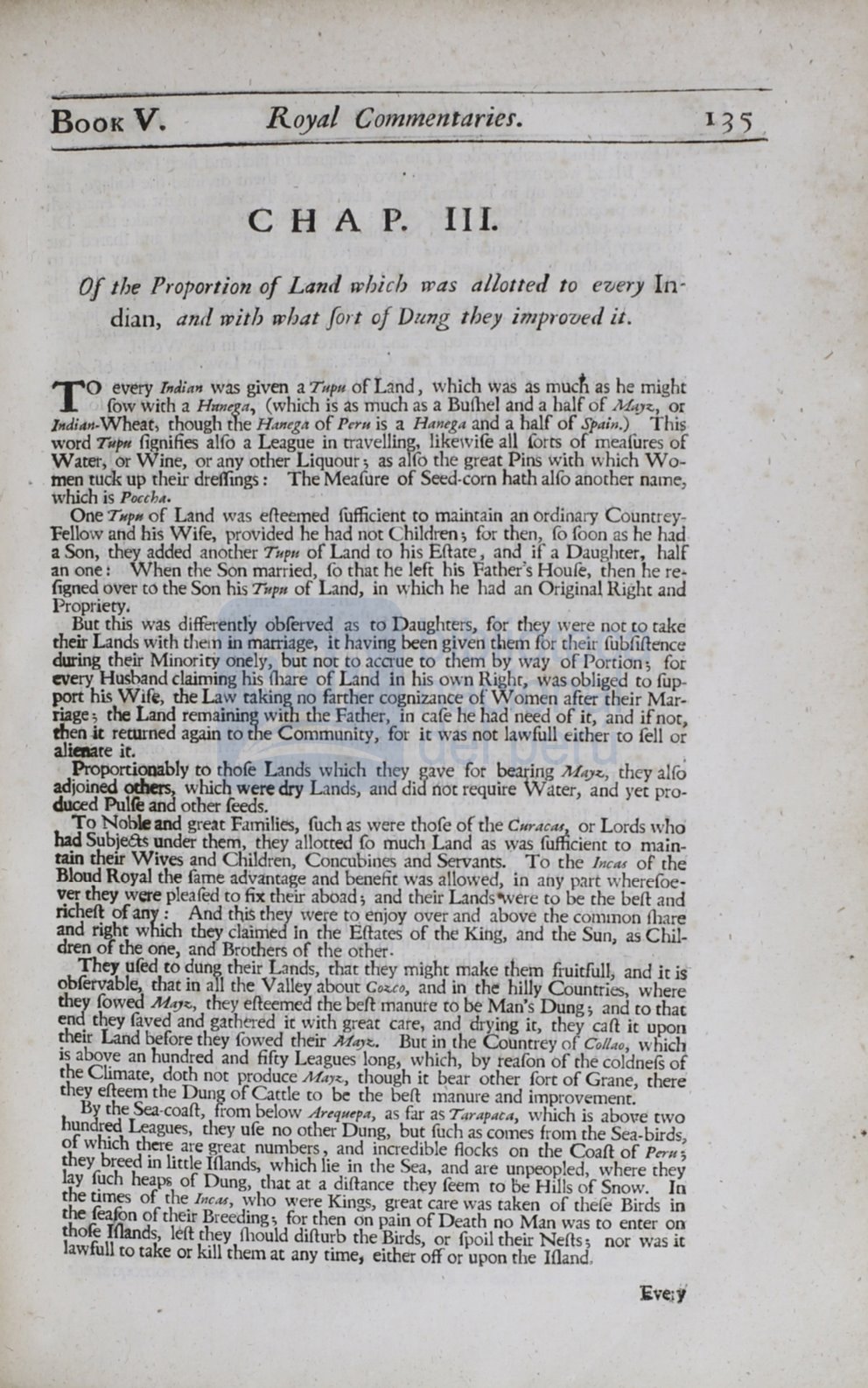

BooK
V.
~
Royal
Commentaries.
. .
I
CH AP.
II
I.
Of
the Proportion of Land which
was
allotted to every
In ..
dian,
and
with
what
fort
of Dung
they
improved
ii.
.
.
T
O every
Indian
was given a
Tapu
of Land, which
was
as mucti as he might
fow
with
a
Httnega,
(which is as much
as
a Bu!hel and a
half
of
M'V~,
or
Indian-Wheat,
though
the
Hanega
of
Peru
is a
Hanega
and a half
of
Spain.)
This
word
Tupa
fignifies alfo a League
in
traveiling, likewife all .forts. of
m~afures
of
Watet, or Wine, or any other Liqueur· as alfo the great Pms with
which
Wo-
..
. men tuck up their dre1fmgs : The Meafure of Seed-corn hath
alfo
another name,
which is
Poccha.
One
THfH
of Land was efieemed fufficient to maintain an ordinary Countrey–
Fellow and his Wife, provided he had not
hildren; for then, fo foon as he had
a Son,
they
added another
Tupu
of Land to his Efiate , and,
if
a Daughter,, half
an one: When the Son married,
fo
rhat he left his Fathe(s Houfe, then he re–
figned over to the Son his
Tupu
of Land, in which he
had
an Original
Right
and
Propriety.
.
But this was differently obferveq as to Daughters, for they were not to take
their Lands with them
in
marriage, it having been given them for their fubfifience
during their Minoricy onely, but not to accrue to them by way of Portion; for
every
Husband claiming
his
{hare of Land in his own Right, was obliged to fup–
port
his
Wif~,
the
Law
taking
no farther cognizance of Women after their Mar–
riage;
the
Land
remaining
with
the Father, in cafe he
had
need
of
it,
and
if
nor,
men..it
rewrned again to the Community, for
it
was not lawfull either to fell or
~~rek
.
Proportionably to thofe Lands which they gave for
beating
May~,
they
alfo
adjoined
9diers,
which were
dry Lands, and did
not
require
Wetter,
and
yet
pro–
chtced Pulfe
and
other feeds.
To Noble and great Families, fuch as were thofe of the
Curac~
or Lords who
bad
Subje& under them, they allotted fo much Land as was fumcient to main–
tain
their Wives and Children, Concubines and Servants. To the
lncM
of
the
Blond
Royal
the fame advantage and benefit was allowed, in any part wherefoe–
ver
they
were pleafed to fix their abbad; and their Lands
ere to be the befr and
richeft of
any
:
And
this
they were to enjoy over and above the common !hare
and right which
they
claimed
ln
the
Efiates of
the
King, and the Sun
11
as Chil–
dren
of the one, and Brothers of the other.
They ufed to dung their Lands, that they might make them fruitfull, and
it
is
obfervable,
that in all the Valley about
Cozco,
and in the hilly Countries, where
they fowed
May~,
they
eO:eemed the beft manute to be Man's
Dung;
and
to
that
en~
they faved and gathered
it
w!th great care,
~nd
drying
it,
they call:
it
upon
~heir
Land before they fowed
their
May~.
But ID .the Countrey of
Co//110,
wnich
1s
above an hundred and
fifty
Leagues
long,
which,
by
reafon of rhe coldnefs of
the Climate, doth not produce
Mayz:,,
though it beat other fort of Grane, there
they efteem
the
Dung ofCattle to be the bell manure and improvement.
By
the Sea-coafi,
from below
Arequepa,
as far as
Tarap11ta,
which
is above two
hufndhir~d
Leagues, they ufe no other Dung, but filch as comes from the Sea-birds,
o w ch there are great numbers , and incredible flocks on the Coafr of
Peru;
they breed
in
little Hlands,
which
lie in the Sea, and are unpeopled, where they
lay
~uch
heapb of Dung, that at a difl:ance they feem to
oe
Hills of Snow.
In
the umes of
the.
Inca-s,
who were Kings,
great
care was taken
of rhefe
Birds
in
the feafon of therr
Breeding;
for then
dn pain
of Death no Man was to enter
on
th1 ofe Iilands,
left
they fhould difturb the Birds, or
f
poll their Nefis
5
nor was
it
awfull to take or kill
chem
at any time
1
either off or upon the
Hland~
(
• +














